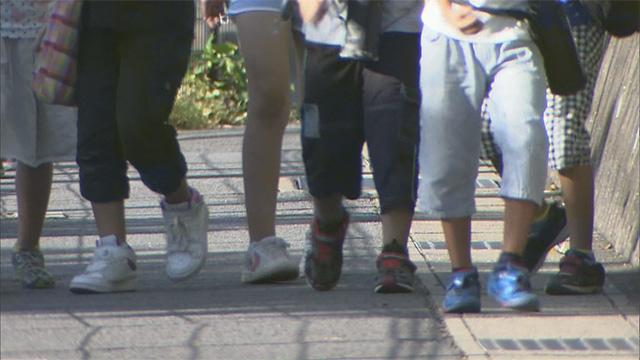Children cry out on social networking sites
As the new school term begins, many students are taking to social networking sites to vent their emotions. One writes, "School started today, but I didn't go. I guess I'm mentally weak. I will probably be yelled at if I continue to skip school. Is it wrong to be absent?" Another says, "I find myself crying on my way to school."
Other users are posting encouraging comments in response, like "Not going to school doesn't make you a loser. Skipping school is not necessarily a bad thing," and "Have the courage to stop forcing yourself to do what you don't want. Live for your future. You can start over as many times as you want."
Children's suicides peak after summer vacation

The Japan Support Center for Suicide Countermeasures investigated the number of children's suicides between the end of July and the end of September -- that's from summer vacation until the new term begins -- in the 10 years up to 2015. It found that the number peaked around the end of August, at 153, and the second-highest timing was the beginning of September, at 122.
An expert says, "The result indicates that going to school is extremely stressful for children who are being bullied or having trouble with their teachers. It is important to not force them to go to school and to take appropriate measures."
Teen contemplating suicide realizes "it's all right for me to exist"
A 19-year-old man living in the Kanto region says he also thought of killing himself at the end of the summer vacation when he was a junior high school student. He remembers thinking, "Why bother going to school to get bullied? I'd rather die." Summer vacation was the only time when he was freed from the ordeal at school. He says he clearly remembers the feeling when he entered his classroom after the break.

"The atmosphere was different from usual. Everyone was excited to be seeing each another for the first time in weeks. If it's uncomfortable from day one, it's really hard to get through the semester."
The bullying started again. It became almost unbearable, and the idea of committing suicide occurred to him again. "I held a cooking knife in my hand and thought, 'I can end everything if I use this. If I disappear, I will no longer have to go to school.'"
Fortunately, he told his parents about his problem and was able to join a free school, where he found happiness. " I found my place there, and I started laughing a lot. I changed. I felt it was all right for me to live, and to exist. If someone is going through what I experienced, I want to say, 'Don't force yourself to go to school. Talk to someone.'"
Counseling via social networking services

Many children find it hard to seek help from their parents or other adults. This is why many organizations around the country are providing counseling through measures that children are familiar with, such as LINE, the free smart phone text messaging app.

Jiro Ito, who heads a non-profit operator of a counseling website, says, "Children feel safe because their faces and voices will not be revealed. By securing anonymity, it becomes easier for them to discuss difficult issues."
The Nagano Prefecture's Board of Education is providing counseling via LINE from August 18th until September 17th. It provided the service from July 1st to 29th and was contacted by 345 people. That's more than the number of phone calls received in a whole year. An official said, "Children seem to find it easier to reach out online, and that led to the increase."
According to the Education Ministry, 19 prefectures and 11 cities are offering counseling over the Internet. More and more NPOs are starting to use social networking services in providing support to children. ChildLine, which has 70 offices across the country and has been operating a children's hotline for 20 years, is also providing chat services every day from August 29th to September 4th.
By clicking the chat icon on its website, children can chat one-on-one with a volunteer. A staff member says, "The service can be used anywhere -- at home or outside, when sensitive issues can't be discussed out loud. We want children to reach out to us, no matter what problem they're facing."
Making it easier for children to seek help

Ito also says, "It's important to let children know that, even if they're in a situation where seeking help is difficult, they can still do so via social networking services. They also need to know that asking for help is important and it is nothing to feel ashamed of."
It's necessary to consider what children are going through when offering help, and to provide them with more places where they can feel at ease to open up about their problems.

